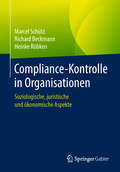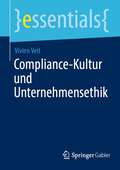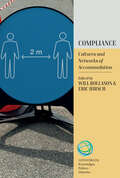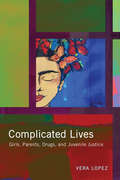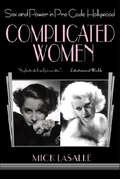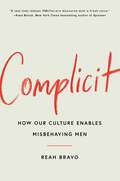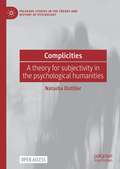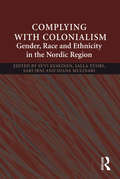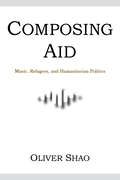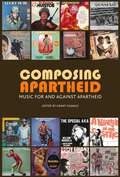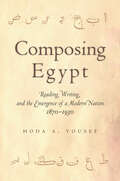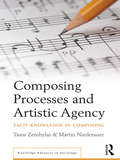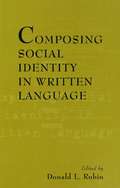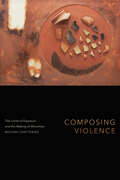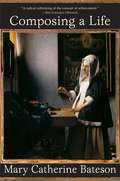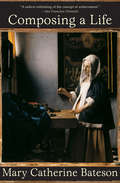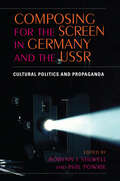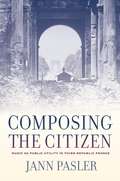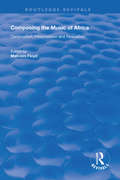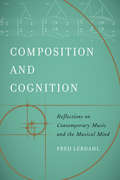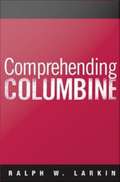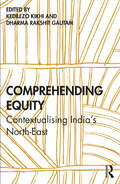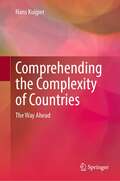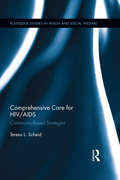- Table View
- List View
Compliance-Kontrolle in Organisationen: Soziologische, juristische und ökonomische Aspekte
by Marcel Schütz Heinke Röbken Richard BeckmannDas Buch bietet eine systematische und interdisziplinäre Darstellung zur Compliance-Kontrolle in Unternehmen, Verwaltungen und weiteren Einrichtungen. Die Autoren befassen sich mit der Diskussion entsprechender Regelwerke bzw. Konzepte sowie den organisatorischen Folgen. Hierzu entwickeln sie sozial-, rechts- und wirtschaftswissenschaftliche Bezüge einer Analyse und Gestaltung organisatorischer Regelsetzung und -begründung. Besonderes Augenmerk gilt dem Spannungsverhältnis formaler und informaler Ordnung sowie dem Ansatz der „brauchbaren Illegalität“. Das Werk richtet sich an mit Compliance-Aspekten beschäftigte Wissenschaftler sowie Experten und Entscheider in Organisationen aller Art.
Compliance-Kultur und Unternehmensethik (essentials)
by Vivien VeitDieses essential beschäftigt sich mit der Frage, was neben einem fundierten Compliance-Management-System nötig ist, um nachhaltig und belastbar eine Kultur der Regeltreue im Unternehmen zu erreichen. Hierzu werden die derzeitigen regulatorischen Ansätze im In- und Ausland sowie Tools und Bausteine vorgestellt, die eine solche Entwicklung begünstigen. Kombiniert mit zahlreichen Statements und konkreten Beispielen und Erfahrungsberichten von Unternehmensvertretern, Beratern und Behördenvertretern entsteht eine Toolbox für Compliance-Verantwortliche, die die Arbeit an individuellen Lösungen erleichtert und darüber hinaus Inspiration für neue Ansätze im eigenen Unternehmen sein kann.
Compliance: Cultures and Networks of Accommodation (Lifeworlds: Knowledges, Politics, Histories #3)
by Eric Hirsch Will RollasonExploring compliance from an anthropological perspective, this book offers a varied and international selection of chapters covering taxation, corporate governance, medicine, development, carbon offsetting, irregular migration and the building trade. Compliance emerges as more than the opposite of resistance: instead, it appears as a valuable heuristic approach for understanding collective life, as a means by which actors strive to accommodate themselves to others. This perspective transcends conventional distinctions between power and resistance, and offers to open up new avenues of anthropological enquiry.
Complicated Lives: Girls, Parents, Drugs, and Juvenile Justice
by Vera LopezComplicated Lives focuses on the lives of sixty-five drug-using girls in the juvenile justice system (living in group homes, a residential treatment center, and a youth correctional facility) who grew up in families characterized by parental drug use, violence, and child maltreatment. Vera Lopez situates girls’ relationships with parents who fail to live up to idealized parenting norms and examines how these relationships change over time, and ultimately contribute to the girls’ future drug use and involvement in the justice system. While Lopez’s subjects express concerns and doubt in their chances for success, Lopez provides an optimistic prescription for reform and improvement of the lives of these young women and presents a number of suggestions ranging from enhanced cultural competency training for all juvenile justice professionals to developing stronger collaborations between youth and adult serving systems and agencies.
Complicated Women: Sex and Power in Pre-Code Hollywood
by Mick LaSalleBetween 1929 and 1934, women in American cinema were modern! For five short years women in American cinema were modern! They took lovers, had babies out of wedlock, got rid of cheating husbands, enjoyed their sexuality, led unapologetic careers and, in general, acted the way many think women only acted after 1968. Before then, women on screen had come in two varieties - good or bad - sweet ingenue or vamp. Then two stars came along to blast away these common stereotypes. Garbo turned the femme fatale into a woman whose capacity for love and sacrifice made all other human emotions seem pale. Meanwhile, Norma Shearer succeeded in taking the ingenue to a place she'd never been: the bedroom. Garbo and Shearer took the stereotypes and made them complicated.In the wake of these complicated women came others, a deluge of indelible stars - Constance Bennett, Ruth Chatterton, Mae Clarke, Claudette Colbert, Marlene Dietrich, Kay Francis, Ann Harding, Jean Harlow, Miriam Hopkins, Dorothy Mackaill, Barbara Stanywyck, Mae West and Loretta Young all came into their own during the pre-Code era. These women pushed the limits and shaped their images along modern lines.Then, in July 1934, the draconian Production Code became the law in Hollywood and these modern women of the screen were banished, not to be seen again until the code was repealed three decades later. Mick LaSalle, film critic for the San Francisco Chronicle, takes readers on a tour of pre-Code films and reveals how this was the true golden age of women's films and how the movies of the pre-Code are still worth watching. The bold, pioneering and complicated women of the pre-Code era are about to take their place in the pantheon of film history, and America is about to reclaim a rich legacy.
Complicit: How Our Culture Enables Misbehaving Men
by Reah BravoA thoroughly researched and deeply personal examination of how women unintentionally condone workplace abuse in a post-#MeToo world—and what we can do to change things for the better. When Reah Bravo began working at the Charlie Rose show, the open secret of Rose&’s conduct towards women didn&’t deter her from pursuing a position she thought could launch her career in broadcast journalism. She considered herself more than capable of handling any unprofessional behavior that might come her way. But she soon learned a devastating truth: we don&’t always react to abusive situations as we imagine we will. When we live in a society where many feminist ideals are mainstream and women hold positions of power, how is it possible that sexual misconduct remains so prevalent? When many employers mandate trainings to prevent harassment of all kinds, why is workplace abuse still so rampant? Weaving her own experience with those of other women and insights from experts, Bravo reveals the psychological and cultural forces that make us all enablers of a sexist and dangerous status quo. By bringing these hard truths into the light, Complicit charts an accessible path toward a better future.
Complicities: A theory for subjectivity in the psychological humanities (Palgrave Studies in the Theory and History of Psychology)
by Natasha DistillerThis Open Access book offers a model of the human subject as complicit in the systems that structure human society and the human psyche which draws together clinical research with theory from both psychology and the humanities to advance a more social just theory and practice. Beginning from the premise that we cannot separate ourselves from the systems that precede and formulate us as subjects, the author argues that, in reckoning with this complicity, a model of subjectivity can be created that moves beyond binaries and identity politics. In doing so, the book examines how we might develop a more socially just psychological theory and practice, which is both systems work and intra-psychological work. In bringing together ways of thinking developed in the humanities with clinical psychotherapeutic practice, this book offers one interdisciplinary take on key questions of social and emotional efficacy in action-oriented psychotherapy work.
Complying With Colonialism: Gender, Race and Ethnicity in the Nordic Region
by Diana Mulinari Suvi Keskinen Salla Tuori Sari IrniComplying with Colonialism presents a complex analysis of the habitual weak regard attributed to the colonial ties of Nordic Countries. It introduces the concept of ’colonial complicity’ to explain the diversity through which northern European countries continue to take part in (post)colonial processes. The volume combines a new perspective on the analysis of Europe and colonialism, whilst offering new insights for feminist and postcolonial studies by examining how gender equality is linked to ’European values’, thus often European superiority. With an international team of experts ranging from various disciplinary backgrounds, this volume will appeal not only to academics and scholars within postcolonial sociology, social theory, cultural studies, ethnicity, gender and feminist thought, but also cultural geographers, and those working in the fields of welfare, politics and International Relations. Policy makers and governmental researchers will also find this to be an invaluable source.
Composing Aid: Music, Refugees, and Humanitarian Politics (Activist Encounters in Folklore and Ethnomusicology)
by Oliver ShaoMusic and arts initiatives are often praised for their capacity to aid in the rehabilitation of refugees. However, it is crucial to recognize that this celebratory view can also mask the unequal power dynamics involved in regulating forced migration. In Composing Aid, Oliver Shao turns a critical ear towards the United Nations-run Kakuma Refugee Camp in Kenya, one of the largest and oldest encampments in the world. This politically engaged ethnography delves into various cultural practices, including hip hop shows, traditional dances, religious ceremonies, and NGO events, in an urbanized borderland area beset with precarity and inequality. How do songs intersect with the politics of belonging in a space controlled by state and humanitarian forces? Why do camp authorities support certain musical activities over others? What can performing artists teach us about the inequities of the international refugee regime?Offering a provocative contribution to ethnomusicological methods through its focus on activist research, Composing Aid elucidates the powerful role of music and the arts in reproducing, contesting, and reimagining the existing migratory order.
Composing Apartheid: Music for and against apartheid
by Grant OlwageComposing Apartheid is the first book ever to chart the musical world of a notorious period in world history, apartheid South Africa. It explores how music was produced through, and was productive of, key features of apartheid’s social and political topography, as well as how music and musicians contested and even helped to conquer apartheid. The collection of essays is intentionally broad, and the contributors include historians, sociologists and anthropologists, as well as ethnomusicologists, music theorists and historical musicologists. The essays focus on a variety of music (jazz, music in the Western art tradition, popular music) and on major composers (such as Kevin Volans) and works (Handel’s Messiah). Musical institutions and previously little-researched performers (such as the African National Congress’s troupe-in-exile, Amandla) are explored. The writers move well beyond their subject matter, intervening in debates on race, historiography, and postcolonial epistemologies and pedagogies.
Composing Egypt: Reading, Writing, and the Emergence of a Modern Nation, 1870-1930
by Hoda YousefIn this innovative history of reading and writing, Hoda Yousef explores how the idea of literacy and its practices fundamentally altered the social fabric of Egypt at the turn of the twentieth century. She traces how nationalists, Islamic modernists, bureaucrats, journalists, and early feminists sought to reform reading habits, writing styles, and the Arabic language itself in their hopes that the right kind of literacy practices would create the right kind of Egyptians. The impact of new reading and writing practices went well beyond the elites and the newly literate of Egyptian society, and this book reveals the increasingly ubiquitous reading and writing practices of literate, illiterate, and semi-literate Egyptians alike. Students who wrote petitions, women who frequented scribes, and communities who gathered to hear a newspaper read aloud all used various literacies to participate in social exchanges and civic negotiations regarding the most important issues of their day. Composing Egypt illustrates how reading and writing practices became not only an object of social reform, but also a central medium for public exchange. Wide segments of society could engage with new ideas about nationalism, education, gender, and, ultimately, what it meant to be part of "modern Egypt."
Composing Processes and Artistic Agency: Tacit Knowledge in Composing (Routledge Advances in Sociology)
by Martin Niederauer Tasos ZembylasThis monograph carries out an in-depth investigation into compositional processes, shedding new light on the components and conditions that constitute artistic agency. Artistic agency relies on the interlocking of such activities that emerge from various propositional and non-propositional (experiential, corporeal, sensory) forms of knowledge - listening, feeling, imagining, trying out, reflecting, noting and correcting, which represents a small selection of the multifaceted composing activities. The book develops an understanding of artistic agency and mastery in its fundamentally social nature, through the important, though largely ignored output of creative compositional processes. Using a mixture of case studies and theoretical frameworks, this book will appeal to sociologists, musicologists, creative studies scholars, and artists, particularly those who teach composition or research on this topic, as well as students of MA- and PhD-level.
Composing Social Identity in Written Language
by Donald L. RubinThis volume constitutes a unique contribution to the literature on literacy and culture in several respects. It links together aspects of social variation that have not often been thus juxtaposed: ethnicity/nationality, gender, and participant role relations. The unifying theme of this collection of papers is that all of these factors are aspects of writers' identities -- identities which are simultaneously expressed and constructed in text. The topic of social identity and writing can be approached from a variety of scholarly avenues, including humanistic, critical, and historical perspectives. The papers in the present volume make reference to and contribute to such humanistic perspectives; however, this book lies squarely within the tradition of social science. It draws primarily upon the disciplines of linguistics, discourse analysis, anthropology, social and cognitive psychology, and education studies. The constituent topics of social identity, style, and writing themselves lie at the intersections of several related fields of scholarship. Writing remains of peak interest to educators from many fields, and is still a "hot" topic. The instructional ramifications of the particular issues addressed in this volume are of vital concern to educational systems adjusting to the realities of our multicultural society. This publication, therefore, should attract a substantial and diverse readership of scholars, educators, and policymakers affiliated with many fields including applied linguistics, composition and rhetoric, communication studies, dialect studies, discourse analysis, English composition, English/language arts education, ethnic studies, language behavior, literacy, sociolinguistics, stylistics, women's studies, and writing research and instruction.
Composing Violence: The Limits of Exposure and the Making of Minorities (Theory in Forms)
by Moyukh ChatterjeeIn 2002, armed Hindu mobs attacked Muslims in broad daylight in the west Indian state of Gujarat. The pogrom, which was widely seen over television, left more than one thousand dead. In Composing Violence Moyukh Chatterjee examines how highly visible political violence against minorities acts as a catalyst for radical changes in law, public culture, and power. He shows that, far from being quashed through its exposure by activists, media, and politicians, state-sanctioned anti-Muslim violence set the stage for transforming India into a Hindu supremacist state. The state's and civil society’s responses to the violence, Chatterjee contends, reveal the constitutive features of modern democracy in which riots and pogroms are techniques to produce a form of society based on a killable minority and a triumphant majority. Focusing on courtroom procedures, police archives, legal activism, and mainstream media coverage, Chatterjee theorizes violence as a form of governance that creates minority populations. By tracing the composition of anti-Muslim violence and the legal structures that transform that violence into the making of minorities and majorities, Chatterjee demonstrates that violence is intrinsic to liberal democracy.
Composing a Life
by Mary Catherine BatesonBateson, an anthropologist among many other roles, analyzes her life and those of 4 other women. She finds that they must constantly improvise and change their ways of living as their environments, their employment, their relationships all evolve over time. Nothing is constant for a lifetime and radical changes do take place. Sometimes they are sought after, sometimes inflicted. There are many gems to be found in this book, regardless of its age.
Composing a Life: The Age Of Active Wisdom (Books That Changed the World)
by Mary Catherine BatesonProfiles of five women that aim “to shed light on personal and career obstacles women face in achieving success” by a cultural anthropologist (Publishers Weekly).Mary Catherine Bateson has been called “one of the most original and important thinkers of our time” (Deborah Tannen). Grove Press is pleased to reissue Bateson’s deeply satisfying treatise on the improvisational lives of five extraordinary women. Using their personal stories as her framework, Dr. Bateson delves into the creative potential of the complex lives we live today, where ambitions are constantly refocused on new goals and possibilities. With balanced sympathy and a candid approach to what makes these women inspiring, examples of the newly fluid movement of adaptation—their relationships with spouses, children, and friends, their ever-evolving work, and their gender—Bateson shows us that life itself is a creative process. “A masterwork of rare breadth and particularity, encompassing all the rhythms of five lives and friendships, and interweaving their stories in ways that reveal grand social truths and peculiar personal graces.”—The Boston Globe“Well-formulated and passionate . . . Offers nothing less than a radical rethinking of the concept of achievement.”—San Francisco Chronicle“As stimulating as it is hopeful . . . shakes up well-meaning truisms . . . adds new dimensions to our views of the world.”—Elizabeth Janeway, author of Man’s World, Woman’s Place“Bateson has an extremely interesting mind and the ability to express herself with extraordinary literary felicity . . . Too much truth steams behind the quiet elegance of these passages.”—The New York Times Book Review
Composing for the Screen in Germany and the USSR: Cultural Politics and Propaganda
by Phil Powrie Robynn J. StilwellDespite the long history of music in film, its serious academic study is still a relatively recent development and therefore comprises a limited body of work. The contributors to this book, drawn from both film studies and musicology, attempt to rectify this oversight by investigating film music from the vibrant, productive, politically charged period before World War II. They apply a variety of methodologies--including archival work, close readings, political histories, and style comparison--to this under explored field.
Composing the Citizen: Music as Public Utility in Third Republic France
by Jann PaslerComposing the Citizen demonstrates how music can help forge a nation. Deftly exploring the history of Third Republic France, Jann shows how French people from all classes and political persuasions looked to music to revitalize the country after the turbulent crises of 1871.
Composing the Music of Africa: Composition, Interpretation and Realisation (Routledge Revivals)
by Malcolm FloydFirst published in 1999, this volume explores the great diversity of music created by African communities is reflected in this book, which discusses the ways in which a wide range of musical forms are composed and performed from Egypt to South Africa and from Ghana to Kenya. As two composers explain here, this diversity provides much inspiration for western contemporary composition. Particular attention is paid to the contexts generate musical creativity. Ceremonies and festivals celebrating birth, death, marriage or rites of passage provide the impetus for much composition and performance, enabling young people to pick up, early on, some of the techniques and styles of which they then become the new exponents. The book also looks at the role played by formal music education programmes and bodies such as the South African Music Rights Organization and the South African Broadcasting Corporation in fostering musical activity, as well as the contribution of composers to the social and political changes that have dominated South African life in recent years.
Composition and Cognition: Reflections on Contemporary Music and the Musical Mind
by Fred LerdahlIn Composition and Cognition, renowned composer and theorist Fred Lerdahl builds on his careerlong work of developing a comprehensive model of music cognition. Bringing together his dual expertise in composition and music theory, he reveals the way in which his research has served as a foundation for his compositional style and how his intuitions as a composer have guided his cognitively oriented theories. At times personal and reflective, this book offers an overall picture of the musical mind that has implications for central issues in contemporary composition, including the recurrent gap between method and result, and the tension between cognitive constraints and utopian aesthetic views of musical progress. Lerdahl’s succinct volume provides invaluable insights for students and instructors, composers and music scholars, and anyone engaged with contemporary music.
Compound Solutions: Pharmaceutical Alternatives for Global Health
by Susan CraddockClaiming 1.5 million lives in 2015, tuberculosis is the world&’s most deadly infectious disease. Because of the population it overwhelmingly affects, however, pharmaceutical companies are uninterested in developing better drugs for the disease. Compound Solutions examines Product Development Partnerships (PDPs), which arose early in the twenty-first century to develop new drugs and vaccines for infectious diseases in low-income countries. Here, for the first time, is a sustained examination of PDPs: the work they do, the partnerships they form, their mission, and their underlying philosophy of addressing global health needs—with implications that extend well beyond tuberculosis.Focusing on two PDPs for tuberculosis—the Global Alliance for TB Drug Development (TB Alliance) and Aeras (a nonprofit focused on vaccine development)—Susan Craddock argues that PDPs do much more than product development. As innovative sites of humanitarian pharmaceutical production, they are contravening mainstream pharmaceutical production by tying drug and vaccine research to global health needs rather than shareholder demand. In largely untethering the profit incentive from pharmaceutical production, Craddock shows, PDPs exhibit more creative and efficient scientific practices, reshaping regulatory norms and implementing more ethical forms of clinical trials that enhance community engagement and capacity building. An unparalleled, interdisciplinary analysis of PDPs as politically, socially, scientifically, and economically innovative sites of pharmaceutical production, Compound Solutions is a must for readers in the fields of public health, science and technology studies, and medical social science.
Comprehending Columbine
by Ralph W. LarkinOn April 20, 1999, two Colorado teenagers went on a shooting rampage at Columbine High School. That day, Eric Harris and Dylan Klebold killed twelve fellow students and a teacher, as well as wounding twenty-four other people, before they killed themselves. <P><P>Although there have been other books written about the tragedy, this is the first serious, impartial investigation into the cultural, environmental, and psychological causes of the massacre. <P><P>Based on first-hand interviews and a thorough reading of the relevant literature, Ralph Larkin examines the complex of factors that led the two young men to plan and carry out their deed. <P><P>For Harris and Klebold, Larkin concludes, the carnage was an act of revenge against the "jocks" who had harassed and humiliated them, retribution against evangelical students who acted as if they were morally superior, an acting out of the mythology of right-wing paramilitary organization members to "die in a blaze of glory," and a deep desire for notoriety. <P><P>Rather than simply looking at Columbine as a crucible for all school violence, Larkin places the tragedy in its proper context, and in doing so, examines its causes and meaning.
Comprehending Equity: Contextualising India’s North-East
by Kedilezo Kikhi Dharma Rakshit GautamThis book interrogates the idea of equity in the context of India’s Northeast region. The region comprises of diverse ethnicities heralding different socio-political and historical contexts. The present volume attempts to bring to the fore, the ever-widening socio-economic gap between dominant and marginalized groups and the challenges of traversing towards equity and social justice in this context. The book looks at the socio-economic disparity and exploitation in the region conspicuous in the form of poor governance, ethnic violence, and a sense of marginalization and disillusionment. Based on case studies and research of different states and communities in the Northeast, the volume discusses the complex and unique socio-economic challenges of the people in the region. It analyses the issues of representation, identity and ethnic dominance, affirmative action, food security, sustainability, access to education, territorial conflicts, ineffective governance, among others. The book offers insights and perspectives into concepts such as equity, justice, fairness, and discrimination by juxtaposing the booming global economic order which depicts the extreme levels of deprivation especially among those belonging to the disadvantaged communities. This volume will be of interest to scholars and researchers of sociology, social anthropology, development studies, politics, law and governance, and South Asia studies.
Comprehending the Complexity of Countries: The Way Ahead
by Hans KuijperThis book argues for computer-aided collaborative country research based on the science of complex and dynamic systems. It provides an in-depth discussion of systems and computer science, concluding that proper understanding of a country is only possible if a genuinely interdisciplinary and truly international approach is taken; one that is based on complexity science and supported by computer science. Country studies should be carefully designed and collaboratively carried out, and a new generation of country students should pay more attention to the fast growing potential of digitized and electronically connected libraries. In this frenzied age of globalization, foreign policy makers may – to the benefit of a better world – profit from the radically new country studies pleaded for in the book. Its author emphasizes that reductionism and holism are not antagonistic but complementary, arguing that parts are always parts of a whole and a whole has always parts.
Comprehensive Care for HIV/AIDS: Community-Based Strategies (Routledge Studies in Health and Social Welfare #12)
by Teresa L. ScheidA comprehensive health care system consists of services that are coordinated and integrated along the full continuum of care. For HIV patients, this includes physical health care, infectious disease management, crisis care, mental health care, substance abuse counseling, and social support services including housing, transportation, subsistence, and supports for dealing with multiple sources of stigma. This book highlights the dilemmas faced in providing comprehensive, integrated care to individuals living with HIV, providing both an understanding of existing efforts to integrate diverse systems of care, as well as insight into ways in which systems of care must be challenged in order to meet the needs of people living with HIV. Comprehensive Care for HIV/AIDS is the result of collaborative work with the county Health Department, numerous community-based organizations, and several planning boards in a metropolitan area, which have sought to provide integrated care to people living with HIV. It will be a valuable resource to the diverse community of HIV researchers, advocates and providers.
